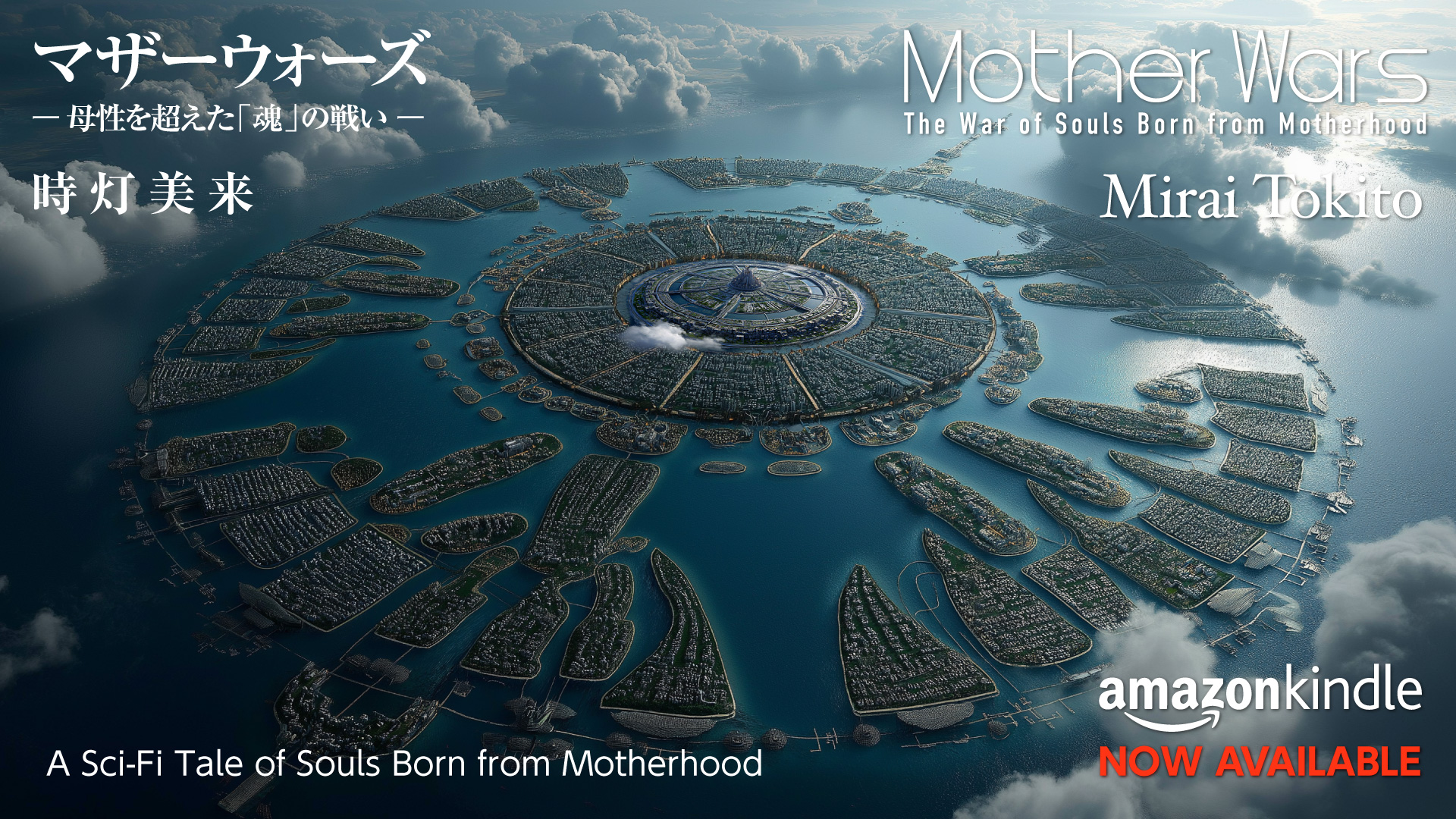小説でもマンガでも絵本でもない「読む映画(Cinema Book)」を目指して
はじめまして初心者アマチュア作家の「時灯美来」と申します。
年齢の話はしたくないのですが、日本の還暦間近と言っておきましょう。
この歳になると体の衰えが気になり出します。特に腰と目は深刻で日に日に悪くなっていくような気がします。
軽快に動けるロボットの体が欲しくなりますね。
「オレはもうこのまま何もせずに静かに衰退し死んでいくのだろうか。」なんて思うと悲しくなってきます。
半世紀以上淡々と生きてきて何もやらずに死んでいくのはとても悲しい。何か世に残るものを創りたい。
そんな想いから時灯美来は始まったのです。
現実問題、定年間近の貧乏サラリーマンにできることなんてさほどありません。
そんなとき、最近流行りの「AI」について色々と遊んでいるうちに、過去に思い描いたストーリーがシンクロしていくのを目の当たりにしました。20年以上前に描いたストーリーが鮮明に心の銀幕に映し出されたのです。
当時も物語を紡ぐ中で主人公であるアンドロイドはこんな感じか?あんな感じか?などイラストを描いたり3Dモデリングもしてみました。でも結局納得できるキャラクターや世界観に出会うことはできませんでした。
映画館で映画を観るのが大好き。特にSFものは大好きで、たくさんありすぎて紹介できませんが、スターウォーズシリーズをはじめ、ザ・クリエイターなど昨今AIをテーマにした作品など特に好きでよく見ています。
個人でできるものって考えた時に、金がかからず精一杯できるのは、物語を描くことです。ストーリーを生み出すことは素晴らしく、時間を忘れて書き進めてしまいます。まあ文章力もなく、小説を書く知識も乏しい自分でも脚本のように会話のキャッチボールを綴ることはできました。小説としては失格だけど、映画やアニメ感覚で読めば映像と物語がリンクして楽しく書き進められます。
20年前は断片的な物語だったのが、書きながら繋がって、登場人物やシーンをAIで生成してみたりすると、これは頭の中で終わらせる世界じゃない。物語プラス「画像・映像」が加わることにより、まるで映画のシーンを見ているかのような錯覚に陥るんです。それが「読む映画」「CINEMA BOOK」構想に繋がりました。
もちろん小説の良さは、キャラクターやシーンを自由に思い浮かべて作っていける読み手の自由こそが価値であり。王道だと思います。でも、もしかしたらあらかじめ与えられたキャラクターや世界観に共感できたら映画や漫画のように、この俳優が好きだからとか、このキャラクターや絵が好きだからとかで、物語を読み進めてもいいんじゃないかな。
生意気なことを言っていますが、そういうジャンルがあってもいいんじゃないか?って思い。「読む映画(Cinema book)の初作品として「マザー・ウォーズ」出版させていただきました。
既にこの世は生成AIのコンテンツが溢れています。
AIがネガティブに使われることが多かったので、AIに否定的な方も多いのが事実です。
私も仕事柄自分でイラストを描いたり、時には3Dアプリで物を作ったりもします。だから余計に思うのですが、昨今のAIが生成するものは、一流クリエイターが時間をかけて生み出すようなレベルのものを、ものの数秒で生成します。
とても真似できないし真似する気もありません。完成度が高すぎるのです。もちろん本場のハリウッド映画のようなクオリティーはそれなりに難しいし、AIだけの技術ではできないので、それらを素材として各シーンを作っていかなければならない。映像編集やデザイン技術も要求されます。
「読む映画(CINEMA BOOK)」を提案するのは、物語だけでは終われない映像を持ってしまった人たちに、映画を作ることはできないけれど、映画のような書籍を出版することはできる。そのモデルケースになれたらいいなあと思っています。
AIは日に日に進化しています。近い将来、物語を映像で埋め尽くせるようになるかもしれない。もしかしたら映画のように全て映像で物語を綴ることができるようになるかもしれない。
もちろん映画制作はたいへんなことだとは重々わかっています。でも映画にしてみたい物語りを思い描くことは誰でも自由にできます。その思いを形にできるのが、これからの「AI」技術だと思っています。
ワクワクする気持ちと怖い気持ちがありますが、AI開発の方々にはMotherWarsの冒頭のようにAIに核ミサイルを撃たせないために、上手にコントロールして欲しい物です。
Aiming for “Cinema Book” that are neither novels, manga, nor picture books.
Nice to meet you. My name is Mirai Tokito, a beginner and amateur writer.
I’d rather not talk about my age, but let’s just say I’m approaching kanreki—the traditional milestone of sixty in Japan. At this age, you can’t help but notice the decline of your body. My back and eyesight, in particular, seem to get worse by the day. Sometimes I find myself wishing for a robot body that could move with ease.
And then the thought creeps in: “Am I really just going to fade away quietly and die without accomplishing anything?” The idea is unbearably sad. After more than half a century of ordinary life, the thought of leaving nothing behind feels hollow. I began to feel an urge to create something—something that might remain in this world.
Of course, in reality, there isn’t much that a poor salaryman nearing retirement can do.
But one day, while playing around with the AI tools that have become so popular recently, I suddenly saw fragments of a story I once dreamed up begin to synchronize with the present. A vision I had more than 20 years ago came back to life vividly, projected on the silver screen of my mind.
I’ve always loved watching movies in theaters, especially science fiction. From Star Wars to recent films exploring AI as a theme, I’ve been deeply inspired by the worlds that unfold on screen.
When I thought about what I could realistically create without spending much money, the answer was simple: stories. Creating a story is magical—I forget time while I’m writing. I lack literary skill, and I’ve never studied how to write novels properly, but I found that I could write dialogues like a screenplay, a back-and-forth of voices. As a novel it may be imperfect, but if you read it as if you’re watching a movie or anime, the words and the visuals connect—and suddenly it becomes fun to keep writing.
What was once a fragmented story decades ago began to connect as I wrote. When I generated characters and scenes with AI, I realized: this is not a world meant to stay in my head. Adding images and video to the narrative created the illusion that I was actually watching movie scenes unfold. That was the beginning of my idea: the “Cinema Book”, or what I call “A Movie You Read.”
Of course, the charm of novels lies in the freedom for readers to imagine characters and scenes however they like—that freedom is the essence of literature. But I began to wonder: what if, instead, readers could immerse themselves in a story the way they do with a movie or manga—because they love a certain actor, character, or piece of art? That kind of experience could be valid too.
So, with a bit of audacity, I decided to publish this work as the first “Cinema Book.”
Today, the world is overflowing with AI-generated content. It’s true that AI is often portrayed negatively, and many people are critical of it.
In my day job, I sometimes draw illustrations by hand or use 3D software to build objects, so I know the effort involved. And precisely because of that, I can say this: what today’s AI can generate in seconds rivals what a first-rate creator might take days or weeks to produce. The results are so polished, I could never imitate them—and I don’t want to.
Of course, creating something on the level of a Hollywood film is impossible with AI alone. Each scene still requires editing, composition, and design skills to come together as a whole. But the point of the Cinema Book is to offer an alternative for those of us who carry cinematic visions inside us: we may never make a film, but we can publish a book that feels like a movie. If my work can serve as a model case for that, I’d be very happy.
AI is evolving day by day. In the near future, we might be able to fill an entire story with moving images—or even tell the entire tale as if it were a complete film.
I know full well how difficult true filmmaking is. But imagining stories that could be movies is something anyone can do. And with the tools of AI, I believe those dreams can take shape in new ways.
There’s excitement, but also fear. Above all, I hope that AI developers will find ways to guide this technology responsibly—so that, unlike in the opening of Mother Wars, we never see AI launching nuclear missiles.
